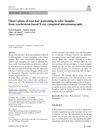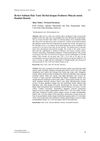 9 citations,
January 2014 in “DARU Journal of Pharmaceutical Sciences”
9 citations,
January 2014 in “DARU Journal of Pharmaceutical Sciences” Cuscuta reflexa extracts helped regrow hair in rats with drug-induced hair loss.
 9 citations,
March 2011 in “Oxidative stress and disease”
9 citations,
March 2011 in “Oxidative stress and disease” Some herbal treatments are effective for skin disorders, but more research and regulation are needed.
 8 citations,
May 2017 in “IUBMB life”
8 citations,
May 2017 in “IUBMB life” Astrotactin proteins are important for brain and skin development and are linked to several neurodevelopmental disorders.
 8 citations,
November 2015 in “Saudi Journal of Biological Sciences”
8 citations,
November 2015 in “Saudi Journal of Biological Sciences” A mix of Panax ginseng and bee-pollen may help prevent prostate enlargement in rats.
 7 citations,
January 2022 in “Evidence-based complementary and alternative medicine”
7 citations,
January 2022 in “Evidence-based complementary and alternative medicine” Ginger supplements helped reduce symptoms and improve metabolic health in hypothyroid patients.
 6 citations,
October 2016 in “Food Science and Biotechnology”
6 citations,
October 2016 in “Food Science and Biotechnology” The water extract of Bituminaria bituminosa, high in phenolic compounds, shows strong antioxidant and enzyme inhibitory potential.
 3 citations,
August 2003 in “International Journal of Cosmetic Surgery and Aesthetic Dermatology”
3 citations,
August 2003 in “International Journal of Cosmetic Surgery and Aesthetic Dermatology” Fiber implants effectively treat permanent hair loss with over 85% success and minimal complications.
 2 citations,
January 2012 in “International Journal of Trichology”
2 citations,
January 2012 in “International Journal of Trichology” Coffee and tea might help hair growth in balding individuals, but side effects and alternative uses are being considered.
 1 citations,
January 2022 in “Research Square (Research Square)”
1 citations,
January 2022 in “Research Square (Research Square)” CRISPR/Cas9 editing in spinach affects root hair growth by altering specific genes.
 1 citations,
January 2020 in “International journal of research in pharmacy and chemistry”
1 citations,
January 2020 in “International journal of research in pharmacy and chemistry” Eclipta alba has many health benefits and potential for medical and nutritional use.
 1 citations,
January 2018 in “Acta dermatovenerologica Alpina, Pannonica et Adriatica (Tiskana izd.)”
1 citations,
January 2018 in “Acta dermatovenerologica Alpina, Pannonica et Adriatica (Tiskana izd.)” The herbal extract was found to effectively reduce and prevent hair loss without any side effects.
 1 citations,
January 2017 in “Organic chemistry”
1 citations,
January 2017 in “Organic chemistry” Tridax procumbens has medicinal properties like healing, pain relief, and infection control.

research Hair
1 citations,
January 2016 in “Springer briefs in molecular science” The document suggests using safer, plant-based hair products instead of harmful synthetic ones.
 June 2024 in “Research Square (Research Square)”
June 2024 in “Research Square (Research Square)” Copper deficiency is linked to post-COVID-19 hair loss in women.
 May 2024 in “Research Square (Research Square)”
May 2024 in “Research Square (Research Square)” Many women in Northern Ghana use plant-based cosmetics like shea butter, and their use is more related to being married than to their job, education, or house.
 May 2024 in “Plant and Soil”
May 2024 in “Plant and Soil” Root hairs in maize grow mainly in air-filled pores, limiting their role in nutrient uptake and plant anchorage.
 April 2024 in “Pharmacognosy research”
April 2024 in “Pharmacognosy research” The herbal hair dye with natural ingredients like henna was successfully made and tested, but more research is needed on its effectiveness on different hair colors and benefits.
 March 2024 in “Journal of Pharmaceutical and Sciences”
March 2024 in “Journal of Pharmaceutical and Sciences” Zaleya pentandra extracts, especially acetone, may be useful for new medicines and food industry applications.
 February 2024 in “Oriental Journal of Chemistry/Oriental journal of chemistry”
February 2024 in “Oriental Journal of Chemistry/Oriental journal of chemistry” Eclipta alba shows promise for treating various health issues and needs more research.
 January 2024 in “Deleted Journal”
January 2024 in “Deleted Journal” Essential oils may help hair health but lack strong scientific proof and can cause allergic reactions.
 October 2023 in “Plant Archives/Plant archives”
October 2023 in “Plant Archives/Plant archives” Hibiscus rosa-sinensis is effective and safe for use in herbal soaps and hair oils, promoting skin and hair health.
 July 2023 in “Journal of Natural Remedies”
July 2023 in “Journal of Natural Remedies” Shell ginger contains kavalactones that promote hair growth and have anti-cancer, anti-inflammatory, and anti-obesity effects.
 January 2023 in “International journal of Ayurveda and pharma research”
January 2023 in “International journal of Ayurveda and pharma research” The herbal shampoo is effective and safe for use.
 September 2022 in “Research Square (Research Square)”
September 2022 in “Research Square (Research Square)” Hydrocolloid wound dressings emit energy that can affect human hair follicle metabolism.
 December 2021 in “Bandung Conference Series. Pharmacy”
December 2021 in “Bandung Conference Series. Pharmacy” Herbal extracts mixed with coconut oil can effectively promote hair growth.
 January 2021 in “Journal of cosmetology & trichology”
January 2021 in “Journal of cosmetology & trichology” L-(+)-Tartaric Acid may help increase certain hair growth genes without harming cells.
 June 2020 in “International journal of medical science and clinical invention”
June 2020 in “International journal of medical science and clinical invention” Modern research supports traditional uses of Yarrow for hair loss and skin issues.
 January 2020 in “Acta Scientiae Veterinariae”
January 2020 in “Acta Scientiae Veterinariae” A dog's chronic bite wound healed successfully using a mix of herbal gel, low power laser, and ozone therapy.
 July 2018 in “Journal of Oral and Maxillofacial Surgery”
July 2018 in “Journal of Oral and Maxillofacial Surgery” Oral and maxillofacial surgery has advanced with fluoride reducing tooth decay and high-speed handpieces aiding in more aesthetic procedures, leading to changes in practice and training.
 May 2016 in “Portuguese National Funding Agency for Science, Research and Technology (RCAAP Project by FCT)”
May 2016 in “Portuguese National Funding Agency for Science, Research and Technology (RCAAP Project by FCT)”






























